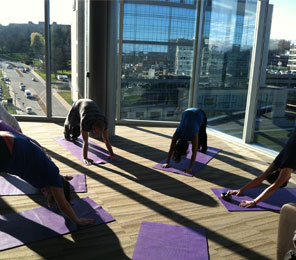 |
|
| Medical students take part in a class so they can understand what patients will be doing. | |
On any given Thursday evening, if you wander into the open space at the north end of the fifth floor in the Ambulatory Care Center, you will witness a diverse group of people practicing yoga, Tai Chi, meditation and guided imagery. Led by two medical students, the group comprises cancer patients, their family members, fellow medical students, oncology nurses and other hospital employees. What ties this group together is a desire to change how people with cancer manage physical and emotional symptoms during treatment and beyond.
The medical students leading the group are fifth-years Vincent Minichiello (formerly Mitchell) and Megan Furnari, who met while teaching a student elective on complementary and integrative medicine, where they discovered a shared passion for incorporating the power of non-traditional Eastern medical approaches into traditional Western medicine. Now they are working together to help cancer patients, and those who care for them, to more holistically manage cancer treatment.
Minichiello, who has been practicing Chinese martial arts since age four, double majored in biology and East Asian studies as an undergraduate at Boston University; studied at the New England School of Acupuncture; and took part in a UMass–China exchange program where he researched how hospitals in China are integrating Eastern and Western medicine. Furnari, who had always been curious about healing work, began practicing yoga and meditation while an undergraduate at Brown University. She quickly became interested in understanding the meaning of health and the multi-faceted approach to healing. She went on to write her senior thesis on the history and practice of alternative and complementary medicine in Providence, and completed a graduate degree in physiology and complementary and alternative medicine at Georgetown, with an additional focus on herbal medicine and mind-body modalities.
Together, Minichiello and Furnari developed a program that incorporates their own complementary medicine strengths. Their goal is to create a model of integrative medicine, teaching patients how to use non-traditional therapies in addition to their current treatment regimes. When they first approached the medical staff of the UMass Memorial Cancer Center of Excellence (where the intervention is taking place) about offering an opportunity for patients and families to learn about and practice complementary medicine, they were very encouraged.
“Many major cancer centers have complementary and integrative programs in place, but for UMass, this is pretty groundbreaking,” said Furnari.
Supported by a stipend from the UMass MLK Semester of Service Award program, Furnari and Minichiello performed a needs assessment to determine the best approach to offering instruction in integrative therapies, such as gentle yoga or guided meditation. They discovered that patients were very open to the idea, with about half preferring private instruction and half preferring group instruction.
Minichiello and Furnari opted to develop a program with a stronger initial emphasis on group instruction to include more participants. They developed a CD for those who may not have access to the group sessions or who prefer to practice on their own. The CD features five tracks, each of which includes a different type of guided meditation/relaxation that has been created by a medical student participating in the project. Examples include progressive muscle relaxation, body scan, guided imagery and heart-centered meditation. Copies of the CD have been distributed to patients and care providers thus far, but could be used as teaching tools in the future.
Before starting the patient classes, a presentation on the project was made to the oncology nursing staff about the theories that support the various modalities and the science behind them. There were also a series of brief demonstration classes for the nurses so they could experience the actual modalities that are used in the patient class. Now, when new patients come in, the nurses can speak from experience about the option of participating. “I’ve seen this happen already, where nurses jump in and advocate for the classes,” said Furnari.
“We also wanted to bring the doctors in, so we gave them a similar presentation,” said Minichiello, speaking about the project at the oncology division meeting in May. “Dr. [Alan] Rosmarin [the Gladys Smith Martin Chair in Oncology, professor of medicine and director of the Cancer Center] was thrilled about the idea.” Their intention is to encourage all oncology care providers to attend the wellness classes, bringing everyone together to promote health and healing.
The group meets every Thursday for 90 minutes, with Furnari teaching yoga and guided imagery/deep relaxation and Minichiello teaching Tai Chi/Qi Gong and breathing exercises. They have about 10 to 12 participants every week, along with a select group of medical students who will eventually teach portions of the class as a way of building sustainability into the program.
The project is still evolving. Furnari and Minichiello need to do research on the effectiveness of their initiative and also need to develop a formal way of sustaining the program after they move on from medical school next year, but they are well on their way to success. “The class started small but it has been growing, word is spreading and people are coming,” said Furnari. “A woman with lung cancer told us it was the first time she could truly breathe without difficulty, and that her neuropathy had stopped bothering her.” Furnari added, “This is why I came to medical school.”
Minichiello and Furnari strongly believe that integrative medicine is the future of health care. “Mind-body modalities change patient’s lives and the way in which they experience illness. They are low cost interventions with incredible yields. As the cost of care rises and budgets get smaller, we must look toward these more innovative approaches,” concluded Furnari.
Related links on UMassMedNow:
MLK Semester of Service Student Awards support local health projects
A chance to try complementary and integrative therapies
Empowering a community
Students help local restaurants create healthy options